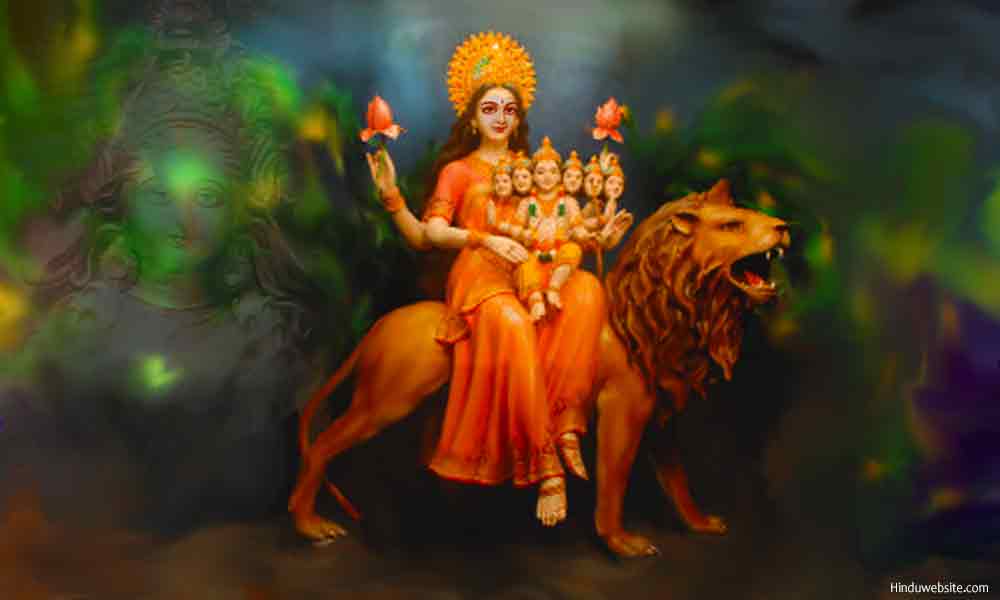
Skanda Matha, the Mother of Skanda

Devi Skandamatha With Skanda in her lap
The Mother Goddess, Parvathi, or Uma, has numerous names. Each of them represents a particular aspect, function, manifestation or victory of her. Each of them is again extolled in worship by numerous other names, which may represent either her particular powers, achievements, or manifestations. Thus, it is very difficult to know how many names of the goddess exist in Hinduism. Hindus know by instinct that whatever name you may ascribe to her, she is the same Shakti, the consort of Shiva, or the Supreme Mother Goddess who is recognized as the ruler and creator of all. In either of the capacities, she personifies matter, power, energy, diversity, dynamism, activity, and femininity of the entire creation and existence.
One of the not so well known names, except for her association with Skanda, as his mother, is Skandamatha. Traditionally, she has been worshipped on the fifth of day of Navarathri, as the fifth aspect or manifestation of Durga. Skanda is the first son of Shiva and Parvathi. He is a war god, who is described in the Puranas as the commander in chief of Shiva's army. As the mother of Skanda, the goddess is also known Kartikeya Matha. She is the fifth manifestation of Durga, the Panchama Durga.
Skandamatha is a ferocious goddess, worshipped by heroes and warriors for victory in wars. She rides the lion as her vehicle. In a sitting position, she is shown as seated in a lotus, symbolizing her status as the goddess of Kundalini. She has a white complexion, with long flowing hair, and bears lotus flowers in two hands, while the other two encircle Skanda in a motherly embrace, with her two palms held in abhaya (assuring) and varada (blessing) mudras (gestures).
Significance
Skandamatha is the mother of warriors. She represents their courage, strength, valor, righteousness, and commitment to duty and virtue. She is the source of victory for people and warriors alike. As the remover of evil powers and negative energies and mother courage and strength, she helps them in both material and spiritual lives. In worldly life, she helps them overcome their enemies and obstacles to achieve victory, peace and prosperity, and in spiritual life she cleanse their sins and evil tendencies so that they can attain purity and salvation through self-transformation.
Skandamatha as the mother of Skanda is both motherly, and ferocious. Her motherly aspect is the source of compassion, love and blessings. Her ferocious aspect is the source of protection, courage and strength to those who are engaged in the battles of daily life on the path of righteousness. When you worship Skandamatha, you automatically worship Skanda, since he is always found in her company, and receive his blessings from both him and his mother. As the goddess of war and destruction, she represents the fire (Agni) aspect of Shiva. Yet, as the goddess who sites in a lotus she represents, consciousness, the power of Kundalini, and the water element.
The legend of Skanda
According to the legends Skanda was born under strange circumstances. It is said that at the behest of gods, Agni stole a ball of fire, which contained the semen of Shiva and the power (shakti) of Parvathi. It was so hot because of the power of Shiva's tapas (meditative fire) that he was unable to carry it for long. Therefore, he dropped it in the water of the River Ganga. From that ball of fire, Kartikeya or Skanda was born. The seven divine mothers (Sapta Matrikas) happened to see him floating in the waters of the river amidst reeds. They picked him up and nursed him as their child.
After he reached a certain age, Parvathi went to them and requested them to return him to her so that she would groom him for the purpose for which he was born. They obliged. She took him back to Kailasa, where he grew up under the care of Shiva and Parvathi. When reached young age, he realized that the purpose of his birth was to slay the demon Tarakasura. The demon had obtained a boon from Brahma in the past that he would remain invincible in the hands of gods. Blessed by his parents, and endowed with numerous power and weapons gifted by the gods, he went to the battle field, and managed to destroy the demon and his entire army. Satisfied by his victory, Shiva conferred upon him the title of commander-in-chief of all the divine forces in the universe.
Suggestions for Further Reading
- The Concept of Atman or Eternal Soul in Hinduism
- The Problem of Maya Or Illusion and How To Deal With It
- Belief In Atman, The Eternal Soul Or The Inner Self
- Brahman, The Highest God Of Hinduism
- The Bhagavad Gita Original Translations
- The Bhagavadgita, Philosophy and Concepts
- Bhakti yoga or the Yoga of Devotion
- Hinduism And The Evolution of Life And Consciousness
- Why to Study the Bhagavadgita Parts 1 to 4
- Origin, Definition and Introduction to Hinduism
- Symbolic Significance of Numbers in Hinduism
- The Belief of Reincarnation of Soul in Hinduism
- The True Meaning Of Renunciation According To Hinduism
- The Symbolic Significance of Puja Or Worship In Hinduism
- Introduction to the Upanishads of Hinduism
- Origin, Principles, Practice and Types of Yoga
- Essays On Dharma
- Esoteric Mystic Hinduism
- Introduction to Hinduism
- Hindu Way of Life
- Essays On Karma
- Hindu Rites and Rituals
- The Origin of The Sanskrit Language
- Symbolism in Hinduism
- Essays on The Upanishads
- Concepts of Hinduism
- Essays on Atman
- Hindu Festivals
- Spiritual Practice
- Right Living
- Yoga of Sorrow
- Happiness
- Mental Health
- Concepts of Buddhism
- General Essays
Image attribution: The image for this essays has been adapted from Wikimedia under Creative Commons ShareAlike 3.0 license, and modified at Hinduwebsite.com. The content is copyright Hinduwebsite.com